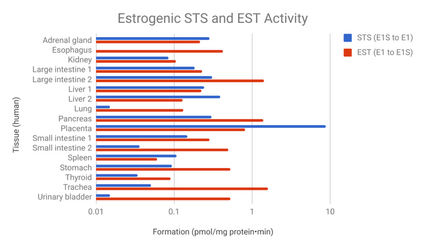Biology:Estrone sulfotransferase
| Estrone sulfotransferase | |||||||||
|---|---|---|---|---|---|---|---|---|---|
| Identifiers | |||||||||
| EC number | 2.8.2.4 | ||||||||
| CAS number | 9026-06-6 | ||||||||
| Alt. names | Estrogen sulfotransferase; EST | ||||||||
| Databases | |||||||||
| IntEnz | IntEnz view | ||||||||
| BRENDA | BRENDA entry | ||||||||
| ExPASy | NiceZyme view | ||||||||
| KEGG | KEGG entry | ||||||||
| MetaCyc | metabolic pathway | ||||||||
| PRIAM | profile | ||||||||
| PDB structures | RCSB PDB PDBe PDBsum | ||||||||
| Gene Ontology | AmiGO / QuickGO | ||||||||
| |||||||||
Estrone sulfotransferase (EST) (EC 2.8.2.4), also known as estrogen sulfotransferase, is an enzyme that catalyzes the transformation of an unconjugated estrogen like estrone into a sulfated estrogen like estrone sulfate. It is a steroid sulfotransferase and belongs to the family of transferases, to be specific, the sulfotransferases, which transfer sulfur-containing groups. This enzyme participates in androgen and estrogen metabolism and sulfur metabolism.
Steroid sulfatase is an enzyme that catalyzes the reverse reaction, the transfer of a sulfate to an unconjugated estrogen.
Reaction
In enzymology, an EST is an enzyme that catalyzes the following chemical reaction:
- 3'-phosphoadenylyl sulfate + estrone [math]\displaystyle{ \rightleftharpoons }[/math] adenosine 3',5'-bisphosphate + estrone 3-sulfate
Thus, the two substrates of this enzyme are 3'-phosphoadenylyl sulfate and estrone, whereas its two products are adenosine 3',5'-bisphosphate and estrone 3-sulfate.
The enzyme also catalyzes the same reaction for estradiol, with estradiol sulfate as the product.
Types
Two enzymes have been identified that together are thought to represent estrone sulfotransferase (EST):[1][2]
- SULT1A1 (catalyzes the reactions estradiol to estradiol sulfate and, to a lesser extent than SULT1E1, estrone to estrone sulfate)
- SULT1E1 (catalyzes the reactions estrone to estrone sulfate and estradiol to estradiol sulfate)
Function
Structure
As of late 2007, 5 structures have been solved for this class of enzymes, with PDB accession codes 1AQU, 1AQY, 1BO6, 1G3M, and 1HY3.
Names
The systematic name of this enzyme class is 3'-phosphoadenylyl-sulfate:estrone 3-sulfotransferase. Other names in common use include 3'-phosphoadenylyl sulfate-estrone 3-sulfotransferase, estrogen sulfotransferase, estrogen sulphotransferase, oestrogen sulphotransferase, and 3'-phosphoadenylylsulfate:oestrone sulfotransferase.
See also
References
- ↑ "The Regulation of Steroid Action by Sulfation and Desulfation". Endocr. Rev. 36 (5): 526–63. 2015. doi:10.1210/er.2015-1036. PMID 26213785.
- ↑ "EC 2.8.2.4 – estrone sulfotransferase and Organism(s) Homo sapiens". EC 2.8.2.4 – estrone sulfotransferase and Organism(s) Homo sapiens. Technische Universität Braunschweig. January 2018. https://www.brenda-enzymes.org/enzyme.php?ecno=2.8.2.4&Suchword=estrone&reference=&UniProtAcc=&organism%5B%5D=Homo+sapiens. Retrieved 10 August 2018. "Substrate: 3'-phosphoadenylyl sulfate + estrone
Product: adenosine 3',5'-bisphosphate + estrone 3-sulfate
Organism: Homo sapiens
Commentary (substrate): high activity by SULT1E1, low activity by phenol sulfotransferase SULT1A1, EC 2.8.2.1". - ↑ "Systemic distribution of steroid sulfatase and estrogen sulfotransferase in human adult and fetal tissues". J. Clin. Endocrinol. Metab. 87 (12): 5760–8. December 2002. doi:10.1210/jc.2002-020670. PMID 12466383.
Further reading
- "Enzymic synthesis of steroid sulphates. 3. Isolation and properties of estrogen sulphotransferase of bovine adrenal glands". Biochim. Biophys. Acta 146 (2): 493–508. 1967. doi:10.1016/0005-2744(67)90233-1. PMID 4965224.
- "Studies on bovine adrenal estrogen sulfotransferase. Inhibition and possible involvement of adenine-estrogen stacking". J. Biol. Chem. 252 (20): 7214–7220. 1967. doi:10.1016/S0021-9258(19)66957-7. PMID 903358.
- "Enzymic synthesis of steroid sulphates. IX. Physical and chemical properties of purified oestrogen sulphotransferase from bovine adrenal glands, the nature of its isoenzymic forms and a proposed model to explain its wave-like kinetics". Biochim. Biophys. Acta 370 (1): 160–88. 1974. doi:10.1016/0005-2744(74)90042-4. PMID 4473218.
 |


